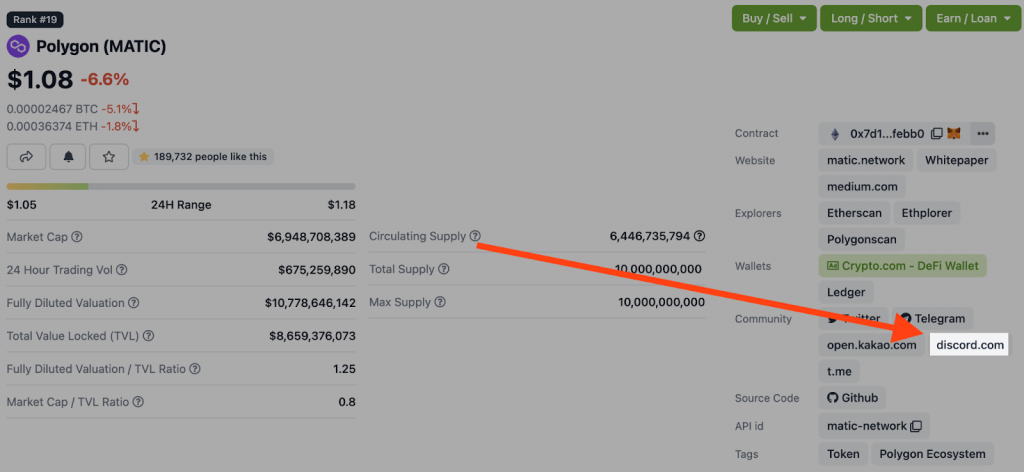Discord has become the go-to tool for interacting with and fostering a community for a growing number of crypto projects. If you’re not on Discord, you are missing out on one of the most effective avenues through which you can get technical assistance, learn about project updates, and get involved in the community of a given project. Below is an explanation of Discord and how to get the most out of it.
How to Set Up Discord
Setting up a Discord account is relatively straightforward. (For explainers and tutorials on key components of Discord, visit the Getting Started section of Discord’s Help Center.)
To join a crypto project’s Discord server, you need a valid invite link. You can often find these links on CoinGecko when viewing a given project’s page. For example, on CoinGecko’s page for Polygon, the valid Discord link is next to the ‘Community’ subheading.

Why Is Discord Useful?
Discord is one of the best places for engaging in project discussion, finding alpha content, engaging with strong communities, engaging with the team, receiving support and tracking project announcements.
Project discussion and alpha content
With such a strong focus on community-building, many server admins share development updates. You’ll often see open discussions about testnets, bugs, issues, mainnet plans, timelines and even hear future plans directly on the Discord through informal conversation. (This way, you’re getting the information before it filters out to the public and news.)
Strong community and active teams
Most projects’ Discord servers are a place to discuss proposals and share thoughts related to the project. You’ll also often see founders and core team members actively responding to questions and feedback.
Announcement channels
Most projects will have an ‘announcement’ channel, making it easy to keep track of the latest developments.
Great for solving technical issues
If you have a problem or technical issue with a cryptocurrency or using a platform the best place to go is often the organisation or team’s Discord. Many times, it’s actively managed and they will often have support-related channels for this type of thing.
This is fantastic for solving issues such as bugs, platform issues or perhaps confusion about how the protocol works. This is a much better place to seek out help compared to other platforms such as Telegram.
A rich history of info via search
If you ask a question and it goes unanswered, chances are it has been answered previously or you posted it in the wrong channel. There should be a rich history of information in the search results.
Great resources
Depending on the Discord server, there will be pinned resources such as explainer docs, whitepapers, roadmaps or FAQs pinned to the welcome channel.
Audio and community calls
Discord has in-built voice channels where users can jump into a voice chat and discuss cryptocurrencies with others. Some projects will also run their community calls via Discord, with members able to jump in and hear the latest from the developers.
Discord Tips & Tricks
Some ways to get even more out of Discord and find alpha include:
- Using the search: Keep search terms simple, and search keywords to maximise your results.
- Be direct: A project’s Discord will often be administered by core team members. If you have a question about the roadmap, product or a general enquiry that has not been asked before, don’t be afraid to ask, as you’ll often get a response from the project’s team.
- Use the channels: Sometimes, your question may not be answered or ignored if you’re not using the appropriate channels. Often a Discord will be split into various channels to manage and focus discussions, such as channels for support, token discussion, particular project-specific products or governance. You should always find a general channel for things that don’t belong elsewhere.
- Be wary of unsolicited private messages: Scammers may try to impersonate Discord admins or a crypto organisation by sending malicious links in DMs. A legitimate admin will never do this. Remember, never share your seed phrase. A good rule of thumb: “If it’s too good to be true, it probably is.

Case study: A founder of an NFT video game lost 16 CryptoPunks and ETH after falling prey to a scammer. He was contacted by a bot on Discord and clicked through to a phishing site, and entered his seed phrase into a fake MetaMask pop-up. (Read more about the scam.)